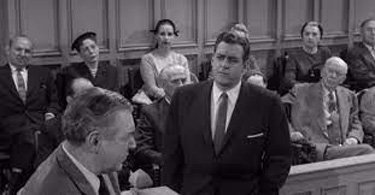Seeing an Older America on Television
American Decline, Chilton Williamson, Perry Mason, Television
World Spectator excerpt 3.
Chilton Williamson confesses to watching old Perry Mason episodes out of nostalgia for the Old Pre-1960s America all we Boomer intellectuals used to despise while we were growing up.
Today, I, too, would trade the gray-flannel-suited, anti-intellectual, Organization Man Establishment of the 1950s for today’s Woke spineless snivelling Establishment in a New York minute.
Over the past year and a half, I have been re-watching episodes of the original show starring Raymond Burr as Mason, Barbara Hale as Della Street, William Hopper as Paul Drake, Ray Collins as Lieutenant Tragg and William Talman as Hamilton Burger. As with so many good things, I found that they had improved with age — not only theirs but my own as well. Several months ago, the discovery that Evelyn Waugh had been a great admirer of Erle Stanley Gardner’s novels, from which the series was adapted, further increased my appreciation and respect for the films. So did learning that Raymond Chandler — a good friend of the author’s — also appreciated the books for their tight structure and for ingenuity of their plots. Having since read three of the Mason books, I understand what Waugh saw in them; also why Chandler privately described Gardner as someone who could be called a writer ‘only by courtesy’.
Gardner, unlike Chandler, was not a descriptive author, nor had he the ability to create mood and atmosphere. Indeed, he was hardly more than a writer of screenplays, which explains in part why the translation of his novels from paper to celluloid was such a brilliant success. Gardner invented the principal characters (Chandler considered Perry Mason a just-about-perfect creation) and the story lines, while the artistes of the Hollywood movie lots supplied the actors, the settings, the backgrounds and interiors, the décor, the clothes and the cars. The result was a precise image of America in the 1950s that seems almost as distant from America in the 21st century as the antebellum era.
My parents considered the United States of the period hopelessly and unspeakably vulgar, shallow, trivial, ugly and uncivilized. Viewed from the perspective of 2021, it appears more like Athens in her Golden Age. Watching Perry Mason is a comforting experience today precisely because America in the Fifties was a comfortable place, and Americans were comfortable with themselves. Gardner’s Mason was perfect for his time: tall, broad-shouldered, and masculine; confident, competent, generous, chivalrous, and — above all — reassuring. He is solid rather than stolid, always in perfect self-control, even-tempered and imperturbable: the personification of the country that had recently won its second world war and was enjoying the ensuing and well-deserved prosperity, and the superior type of American who is wholly representative of his country without standing above it.
Along the same lines, I’ve become aware myself of an ever-increasing fondness for 1940s and 1950s B movies, resulting simply from the comfort of revisiting a so-much more adult and masculine America full of optimism and self-confidence, and generally completely lacking any insolent, whining, power-hungry Identity Groups, and one in which adults talk, act, and dress like adults.




